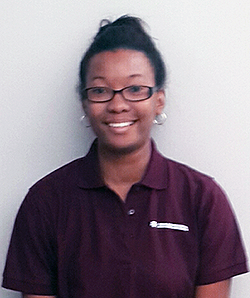 Andrea Locke, graduate student in the Department of Biomedical Engineering at Texas A&M University, has been named recipient of the 2015-2016 Outstanding Engineering Doctoral Graduate Student Award.
Andrea Locke, graduate student in the Department of Biomedical Engineering at Texas A&M University, has been named recipient of the 2015-2016 Outstanding Engineering Doctoral Graduate Student Award.
The award recognizes exceptional achievement and overall performance by a doctoral student. Awardees must be in good academic standing with a minimum cumulative and degree GPA of at least 3.75. As a recipient of the award, Locke was formally honored at this year’s Dwight Look College of Engineering Student Awards Banquet where she received a commemorative memento and a one-time scholarship of $5,000.
Locke, who is advised by Charles H. and Bettye Barclay Professor Gerard Coté, has maintained a 3.88 GPA while working in Coté’s Optical Bio-Sensing Laboratory. Her research, which she has conducted with Coté and Associate Professor Melissa Grunlan, has focused on the development of an implantable optical glucose biosensor for noninvasive detection of glucose for diabetics. Specifically, she is combining a novel fluorescent glucose sensing chemistry within a polymer cylinder about the size of a grain of rice that can be implanted just below the skin and, once implanted, can be probed noninvasively using a watch type device that will measure glucose. In addition, Locke helps lead a team of students including one junior Ph.D. and two undergraduate students through the various aspects of the project.
While at Texas A&M, Locke has published in two high-impact refereed journal papers with a third publication in submission. She also has invented a new patent-pending technique for encapsulating the sensing chemistry in a cylinder used in her research. The impact of Locke’s work, Coté says, has huge implications for people suffering from diabetes. Once this platform is optimized and implanted, the glucose-monitoring biosensor Locke is helping to develop could remove the need for finger pricks throughout the day.
In addition to her research activities, Locke has engaged with the department through a number of service-oriented activities including serving as a student ambassador and participating in the university’s student chapter of Engineering World Health through which she assisted in the assembly of low-cost ECG simulators that were donated to clinics in developing countries.
Locke is treasurer of the Texas A&M student chapter of the International Society for Optics and Photonics (SPIE) and through that organization has participated in outreach programs at local middle and high schools that educate students about optics and the impact biomedical engineers have in the medical field.
About the Department of Biomedical Engineering
Committed to solving the world’s greatest health problems through the exploration of new ideas, integrated research and innovation, the Department of Biomedical Engineering at Texas A&M is producing the next generation of biomedical engineers, developing new technologies and new jobs, and achieving revolutionary advancements for the future of health care. The department has unique strengths in regenerative engineering, medical augmentation, molecular diagnostics/theranostics, tele-health, and precision medicine, and its faculty members are internationally recognized with collaborative relationships that span engineering, physical and natural sciences, medicine and veterinary sciences.